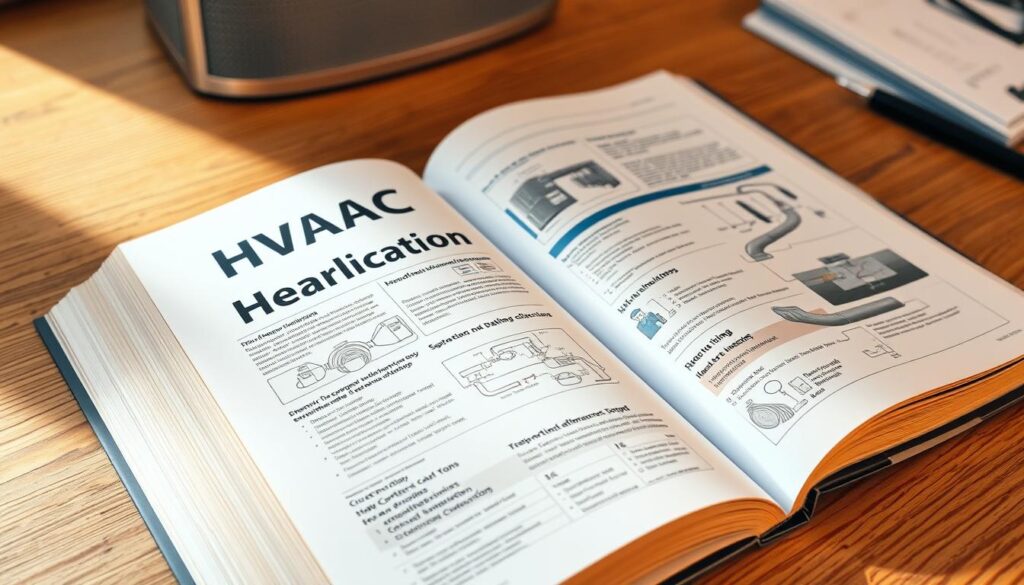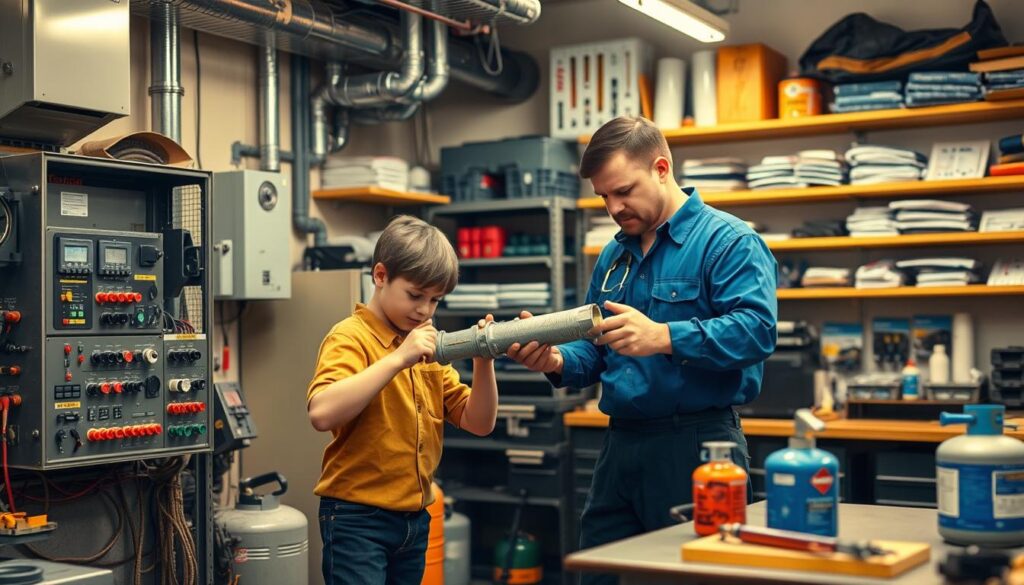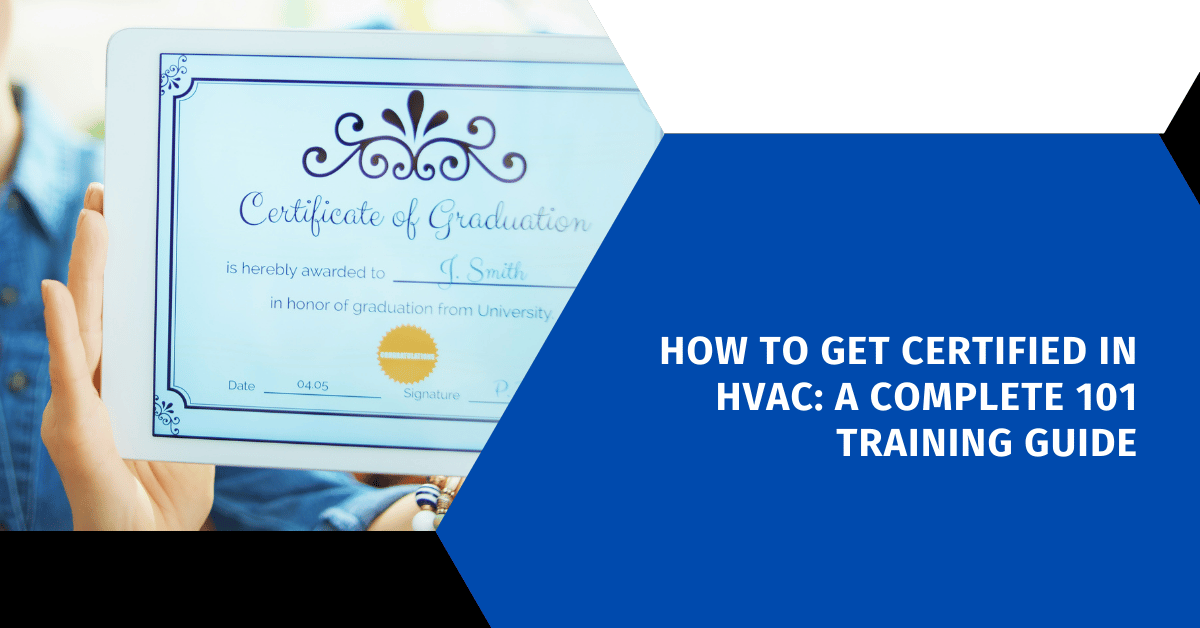Affiliate Disclosure
HVAC Guide Guys is a participant in the Amazon Services LLC Associates Program, an affiliate advertising program designed to provide a means for sites to earn advertising fees by advertising and linking to Amazon.
How to Get Certified in HVAC? To enter this exciting field, you need good HVAC training. This training mixes technical knowledge with hands-on skills. Getting certified prepares you for a fulfilling job in a growing industry.

Starting a career in heating, ventilation, and air conditioning (HVAC) begins with getting certified. With technology getting better and energy saving important, HVAC experts are needed everywhere in the U.S.
Getting certified in HVAC means learning about complex systems and mastering technical skills. You also need to meet high industry standards. This guide will show you how to get your HVAC certification, from school to special training.
Key Takeaways
- HVAC certification provides a structured pathway to a technical career
- Training programs typically last around 41 weeks
- Certification demonstrates professional competence
- Multiple career paths exist within the HVAC industry
- Continuous learning is essential for career advancement
Table of Contents
Understanding the HVAC Industry and Career Opportunities
The HVAC industry is booming, offering great career chances. With new tech and tighter green rules, the need for skilled HVAC workers is growing. This is true for homes, businesses, and factories.
Current Market Demand and Growth Potential
Several things make the HVAC field very appealing. It’s expected to grow a lot, with many jobs opening up for those who are trained.
- Projected job growth of 13% through 2028
- Increasing demand for energy-efficient systems
- Rapid technological advancements in climate control
Types of HVAC Career Paths
Your HVAC career can go in many directions. Each path has its own challenges and chances to specialize.
| Career Path | Primary Focus | Typical Employers |
|---|---|---|
| Residential Technician | Home heating and cooling systems | Private contractors, home service companies |
| Commercial HVAC Specialist | Large building climate control | Office complexes, hospitals, schools |
| Industrial Refrigeration Expert | Complex cooling systems | Manufacturing, food processing |
Average Salary Expectations
HVAC pros get good pay that goes up with experience and skills. Starting wages for newbies are solid, and there’s room to grow as you get better.
- Entry-level: $35,000 – $45,000 annually
- Experienced technicians: $50,000 – $75,000
- Specialized experts: $75,000 – $100,000+
Staying up-to-date with new skills is crucial for success in the HVAC world.
Educational Prerequisites for HVAC Certification
To start a successful HVAC career, you need to meet certain educational requirements. Your path begins with a strong educational base. This prepares you for technical training and certification.
High school graduates have a big advantage in HVAC education. They usually have a solid educational background. This includes:
- Completion of a high school diploma or GED
- Strong mathematical skills
- Basic understanding of physics and mechanical systems
- Problem-solving capabilities
HVAC prerequisites go beyond just basic education. Employers look for candidates with practical knowledge and specific skills. Technical programs and vocational schools provide the needed training. They mix academic learning with industry-specific expertise.
| Educational Level | Recommended Preparation |
|---|---|
| High School | Focus on math, physics, and shop classes |
| Post-Secondary | Technical certificate or associate degree in HVAC |
| Advanced Training | Specialized certifications and apprenticeship programs |
Your academic preparation is key to a strong HVAC career. Investing in your education now opens up many opportunities in this exciting field.
Explore Our HVAC Shop
Looking for top-rated HVAC tools, parts, and accessories? Visit our shop and find the perfect solution for your needs.
Visit the ShopHow to Get Certified in HVAC
Becoming a certified HVAC professional is a journey with many steps. You need to meet industry standards and legal requirements to practice as an HVAC technician.
Core Certification Requirements
To begin, you must complete several key steps:
- Earn a high school diploma or GED
- Complete an accredited HVAC training program
- Gain practical work experience
- Pass industry-recognized certification exams
State-Specific Requirements
HVAC license requirements differ by state. It’s important to check local regulations. Each state has its own rules for certification, experience, and exams.
| State | Experience Hours | Exam Type |
|---|---|---|
| California | 4 Years | State Licensing Exam |
| Texas | 3 Years | EPA & State Certification |
| Florida | 4 Years | Journeyman Exam |
Certification Costs and Timeline
Getting certified in HVAC requires money and time. Here are typical costs and timelines:
- Training Program: $1,200 – $15,000
- Certification Exams: $150 – $500
- Total Timeline: 6 months – 2 years
With careful planning and dedication, you can successfully get certified. This will start your HVAC career.
HVAC Training Program Components
Starting HVAC training courses means diving into a detailed program. It’s designed to turn you into a skilled pro. The HVAC program covers key areas to get you ready for real-world HVAC challenges.
Your training will mix theory and practical skills. Important parts of HVAC training include:
- Direct refrigeration system basics
- Advanced HVAC system design
- Installation and best practices
- Maintenance and repair methods
- Energy efficiency tech
The HVAC program curriculum does more than teach basics. You’ll learn about new tech, how to diagnose problems, and safety rules. Hands-on training is key. It lets you use what you learn in real and simulated settings.
Today’s HVAC training also covers new tech like smart homes and green energy. This makes sure you’re ready for today’s and tomorrow’s needs.
“The best HVAC pros mix technical skills with problem-solving.” – Industry Expert
Going through an HVAC program gets you ready for tough system challenges. You’ll learn about complex mechanical links and gain the skills to succeed in this fast-changing field.
Explore Our HVAC Shop
Looking for top-rated HVAC tools, parts, and accessories? Visit our shop and find the perfect solution for your needs.
Visit the ShopEssential Skills and Knowledge Areas
To be a great HVAC technician, you need more than basic knowledge. You must have a mix of technical skills, safety awareness, and hands-on experience. This part talks about the key skills that make HVAC pros stand out.
Mastering HVAC Technical Skills
Your technical skills are the base of your career. These skills cover many important areas:
- Electrical system diagnostics
- Refrigeration cycle understanding
- Advanced HVAC control system knowledge
- Complex system troubleshooting
- Precise system installation techniques
Comprehensive Safety Training Protocols
Safety training is crucial to keep you and others safe. Important safety points include:
- Proper refrigerant handling procedures
- Electrical safety practices
- Personal protective equipment (PPE) usage
- Risk assessment and mitigation strategies
Tools and Equipment Expertise
Knowing how to use special HVAC tools makes you stand out. Focus on getting good with these tools:
| Tool Category | Essential Tools | Primary Function |
|---|---|---|
| Measurement Tools | Multimeter, Manifold Gauges | Diagnostic Precision |
| Cutting Tools | Pipe Cutters, Tube Benders | System Installation |
| Specialized Equipment | Recovery Machines, Leak Detectors | Advanced Maintenance |
By honing your technical skills and focusing on safety, you’ll be a top HVAC pro. Keep learning and practicing to succeed.
Hands-On Experience and Apprenticeship Opportunities

HVAC apprenticeship programs are a great way to start your career in heating, ventilation, and air conditioning. They mix hands-on skills with classroom learning. This gives you a strong base for success.
Typical HVAC practical training programs include several key components:
- 4-5 years of structured apprenticeship
- Minimum 2,000 hours of on-the-job training annually
- 144 classroom instruction hours per year
- Direct mentorship from experienced technicians
In your HVAC apprenticeship, you’ll learn skills that books can’t teach. You’ll learn to fix system problems, install systems, and understand complex mechanics. Plus, you’ll earn a good wage.
Finding the right apprenticeship needs careful planning. Here are some tips:
- Contact local HVAC contractors
- Check union training centers
- Explore technical college partnerships
- Utilize online apprenticeship databases
Your HVAC practical training turns theory into real-world skills. It prepares you for a fulfilling career in this fast-paced industry.
EPA Certification Requirements and Process
To be a top HVAC technician, you need more than just skills. You must have the EPA 608 certification. This shows you know how to handle refrigerants safely. It also means you follow federal rules and protect the environment.
Types of EPA Certifications
The EPA has four main certifications for HVAC pros:
- Type I: Covers small appliances like residential refrigerators
- Type II: Focuses on high-pressure appliances and industrial equipment
- Type III: Designed for low-pressure refrigeration systems
- Universal: Comprehensive certification covering all refrigerant types
Study Materials and Exam Preparation
Getting ready for your EPA 608 test takes hard work. You’ll need online courses, practice exams, and EPA study guides. Many schools and training programs have special courses to help you pass.
| Certification Type | Exam Focus | Recommended Preparation |
|---|---|---|
| Type I | Small Appliance Refrigerants | Online modules, practice tests |
| Type II | High-Pressure Systems | Technical textbooks, hands-on training |
| Type III | Low-Pressure Refrigeration | Specialized HVAC courses |
| Universal | All Refrigerant Types | Comprehensive study program |
Certification Maintenance
Your EPA 608 certification is a big deal. It doesn’t expire, but you must keep up with HVAC changes. Go to training sessions and stay updated on environmental rules to stay ahead.
Explore Our HVAC Shop
Looking for top-rated HVAC tools, parts, and accessories? Visit our shop and find the perfect solution for your needs.
Visit the ShopSpecialized HVAC Certifications and Advanced Training
To move up in the HVAC field, you need more than basic training. Getting specialized HVAC certifications can make you stand out. This opens doors to better jobs and special career paths.
Many professional groups offer advanced HVAC certifications. These can boost your skills:
- Commercial Refrigeration Specialist
- Energy Management Certification
- Green Technology HVAC Certification
- Smart Home Systems Integration
Organizations like North American Technician Excellence (NATE) and HVAC Excellence offer top HVAC specializations. These show you know the latest in sustainable HVAC and smart building tech.
| Certification | Focus Area | Career Impact |
|---|---|---|
| NATE Certification | Advanced Technical Skills | Higher Earning Potential |
| Green Tech Specialist | Sustainable HVAC Solutions | Growing Market Demand |
| Smart Systems Integration | IoT and Building Automation | Cutting-Edge Technology |
Getting advanced HVAC certifications shows you’re serious about growing in your career. These special skills not only improve your technical abilities. They also make you a forward-thinking pro in the fast-changing HVAC world.
State Licensing Requirements and Regulations

Understanding HVAC state licensing can be tricky. Each state has its own rules for heating, ventilation, and air conditioning professionals. Knowing these rules is key for your career and staying legal.
HVAC rules change a lot from state to state. It’s important to check the specific rules in your area. Some states have strict certification, while others are more relaxed.
Application Process for HVAC Licensing
The HVAC state licensing application has several steps:
- Complete required educational training
- Accumulate verified work experience
- Pass state-specific technical examinations
- Submit detailed professional documentation
- Pay applicable licensing fees
Renewal Requirements
To keep your HVAC license, you need to renew it. Most states require:
- Proof of continuous professional practice
- Completion of continuing education credits
- Payment of renewal fees
- Updated background checks
Continuing Education
Continuing education is vital for HVAC state licensing. States usually ask for 8-16 hours of approved training each year. These courses help you keep up with:
- Emerging industry technologies
- Safety regulations
- Energy efficiency standards
- Advanced technical skills
Always check with your state’s licensing board for the latest HVAC rules and requirements. This will help you keep your professional status strong.
Professional Organizations and Industry Resources
Joining HVAC professional associations and using industry resources can really help your career. These groups offer key support for those wanting to grow their skills. They help you keep up with the fast-changing HVAC world.
Important HVAC professional associations offer big benefits. They help technicians and engineers a lot. Some top groups are:
- American Society of Heating, Refrigerating and Air-Conditioning Engineers (ASHRAE)
- Air Conditioning Contractors of America (ACCA)
- North American Technician Excellence (NATE)
- Refrigeration Service Engineers Society (RSES)
Being part of these associations gives you access to great resources. You get:
- Chances to meet industry leaders
- Latest technical publications
- Opportunities for ongoing education
- Paths to get professional certifications
| Organization | Key Benefits | Membership Cost |
|---|---|---|
| ASHRAE | Technical research, global conferences | $195-$250 annually |
| ACCA | Business resources, training programs | $300-$500 annually |
| NATE | Professional certification, skill validation | $50-$100 annually |
You can also use online forums, trade magazines, and websites. They keep you updated on new tech and trends.
Investing in your growth through these groups can really boost your HVAC career. It will make you more skilled and knowledgeable.
Explore Our HVAC Shop
Looking for top-rated HVAC tools, parts, and accessories? Visit our shop and find the perfect solution for your needs.
Visit the ShopCareer Advancement and Specialization Options
The HVAC industry is full of chances for growth and development. As you move up, you’ll find many ways to specialize. This lets you turn your basic skills into more advanced roles.
Expanding your HVAC career means focusing on special areas and learning more. The best chances often come from:
- HVAC Project Management
- Commercial Refrigeration Systems
- Industrial HVAC Engineering
- Energy Efficiency Consulting
- Building Automation Systems
To get into these special areas, you might need more certifications and training. Those who keep learning and growing can earn more and be more valuable in the job market.
“Continuous learning is the key to unlocking advanced career paths in the HVAC industry.” – HVAC Industry Expert
For those who have been in the field for a while, starting your own business is a great option. You could offer specialized consulting or focus on green tech or complex projects.
Getting ahead in your career means:
- Getting advanced certifications
- Learning new technical skills
- Connecting with other professionals
- Keeping up with new tech
By always learning and improving, you can make your HVAC career exciting and fulfilling. It will have lots of room for growth.
Conclusion
Getting an HVAC certification opens doors to a dynamic and rewarding career. The HVAC industry is growing fast, with more jobs for skilled technicians. Your investment in training and certification can lead to long-term success.
The benefits of HVAC certification go beyond just getting a job. You’ll learn new skills, gain credibility, and find special areas to focus on. Each certification you get makes you more attractive to employers and can increase your earnings.
Your career journey doesn’t stop after you get certified. Keep learning and stay up-to-date with new technologies. The HVAC field has many paths to grow, from starting as a technician to becoming a consultant or manager. By always learning and improving, you can have a fulfilling and adaptable career.
Start your journey today. Look for training programs, join professional groups, and explore the many opportunities in HVAC. Your future as a skilled HVAC professional is bright, offering a stable, challenging, and rewarding career.
FAQ
How long does it take to become an HVAC technician?
What are the minimum educational requirements for HVAC certification?
How much does HVAC certification cost?
How long does it take to become an HVAC technician?
What are the minimum educational requirements for HVAC certification?
How much does HVAC certification cost?
FAQ
How long does it take to become an HVAC technician?
Becoming an HVAC technician takes about 6 months to 2 years. You need to finish a vocational program or technical school. Then, you’ll do an apprenticeship. Getting certifications and state licenses might take more time.
What are the minimum educational requirements for HVAC certification?
You need a high school diploma or GED for HVAC certification. Science and math classes in high school help a lot. Many schools offer HVAC programs for more education.
How much does HVAC certification cost?
HVAC certification costs between
FAQ
How long does it take to become an HVAC technician?
Becoming an HVAC technician takes about 6 months to 2 years. You need to finish a vocational program or technical school. Then, you’ll do an apprenticeship. Getting certifications and state licenses might take more time.
What are the minimum educational requirements for HVAC certification?
You need a high school diploma or GED for HVAC certification. Science and math classes in high school help a lot. Many schools offer HVAC programs for more education.
How much does HVAC certification cost?
HVAC certification costs between $1,000 and $15,000. Technical school programs are $3,000 to $10,000. Apprenticeships cost less. You’ll also pay for exams, tools, and licensing fees.
Do I need EPA certification to work as an HVAC technician?
Yes, you need EPA 608 certification for refrigerant work. There are four types: Type I, Type II, Type III, and Universal. It’s needed for legal and environmental reasons.
What are the career advancement opportunities in HVAC?
HVAC jobs can lead to senior technician, project manager, system designer, or business owner. Specializing in areas like commercial refrigeration or smart homes can increase your salary.
Are HVAC certifications valid across all states?
No, state licensing rules vary. Some certifications are national, but you must check state laws. You might need extra licenses or exams. Always check with your state’s licensing board.
What skills are most important for HVAC technicians?
Key skills include electrical and refrigeration knowledge, safety, and tool use. Problem-solving and customer service are also vital. Keeping up with new technologies is important too.
How much can I expect to earn as an HVAC technician?
New HVAC techs make $35,000 to $45,000 a year. With more experience and certifications, you can earn $50,000 to $75,000. Managers and specialized techs can make over $80,000.
What are the best professional organizations for HVAC technicians?
ASHRAE, ACCA, and NATE are top organizations. They offer networking, education, and career growth resources.
Is hands-on experience really necessary for HVAC certification?
Yes, hands-on experience is key. Most programs and apprenticeships require it. Apprenticeships combine classroom and real-world training. This is crucial for skill development.
,000 and ,000. Technical school programs are ,000 to ,000. Apprenticeships cost less. You’ll also pay for exams, tools, and licensing fees.
Do I need EPA certification to work as an HVAC technician?
Yes, you need EPA 608 certification for refrigerant work. There are four types: Type I, Type II, Type III, and Universal. It’s needed for legal and environmental reasons.
What are the career advancement opportunities in HVAC?
HVAC jobs can lead to senior technician, project manager, system designer, or business owner. Specializing in areas like commercial refrigeration or smart homes can increase your salary.
Are HVAC certifications valid across all states?
No, state licensing rules vary. Some certifications are national, but you must check state laws. You might need extra licenses or exams. Always check with your state’s licensing board.
What skills are most important for HVAC technicians?
Key skills include electrical and refrigeration knowledge, safety, and tool use. Problem-solving and customer service are also vital. Keeping up with new technologies is important too.
How much can I expect to earn as an HVAC technician?
New HVAC techs make ,000 to ,000 a year. With more experience and certifications, you can earn ,000 to ,000. Managers and specialized techs can make over ,000.
What are the best professional organizations for HVAC technicians?
ASHRAE, ACCA, and NATE are top organizations. They offer networking, education, and career growth resources.
Is hands-on experience really necessary for HVAC certification?
Yes, hands-on experience is key. Most programs and apprenticeships require it. Apprenticeships combine classroom and real-world training. This is crucial for skill development.

